大学英语四六级考试听力解题技巧
大学英语四级听力题型题型及答题技巧

大学英语四级听力题型题型及答题技巧听力部分的分值在四级考试中占35%,录音播放时间在35分钟左右。
如何在这“惊心动魄”的半小时中,有效把握信息点,是很多考生颇为头疼的问题。
下面是由给大家带来的大学英语四级听力题型分析及答题技巧,一起来看看吧!大学英语四级听力题型分析一、新闻题。
新闻题的特点是原文会开门见山交待发生的事情。
而往往新闻题的第一道题考的也是新闻主旨,所以新闻题的开头部分很重要。
后面通常是围绕新闻主旨进行细节描述,那么后一道或者后两道会出在细节上。
另外熟悉新闻常用词也是必要的。
当然具体到每道题的方法还会有各自特点,下面做逐题分析1新闻第一题在开头部分找答案,本题从开头部分通过视听一致即可确定,预览选项先划出选项中的重点词,因为A/B/D三项均没有听到其中的重点词,只有C项中dangerous明显听到。
2 预览此题为短词选项,短词选项通常符合视听一致,但难点是容易出现干扰项。
但窍门在于如果出现没听懂却只听到选项其中两个词的情况,历年考试规律是选后者正确概率大得多。
不过,本题没有出现干扰项,所以很简单属于送分题。
3 第二篇新闻题是事故类新闻,这类新闻更是会开头交待出时间人物地点事件。
这篇新闻题第一题仍然是问发生的什么事情,考生抓住开头介绍,视听一致确定答案。
4抓住关键词: so that ,关键词加视听一致即可。
5 第三个新闻题第一题仍旧考题出在新闻主旨上,同样的方法,简单预览选项,文章开头第一句视听一致。
6本题是细节题。
考生应该注意的是新闻题中遇到“目击证人说/有关部门说/相关研究人员说”这类句子要认真听,此处容易出题。
本题,原文中announce(宣称)后视听一致确定答案。
7同样新闻题中出现时效性的分析或者预测都会是考点,所以诸如某人predict/estimate/ assess/confirm这样的句子时认真听,本题he estimated that…后面视听一致很容易听到lose jobs,本题无干扰项,容易确定答案。
六级英语听力技巧和方法
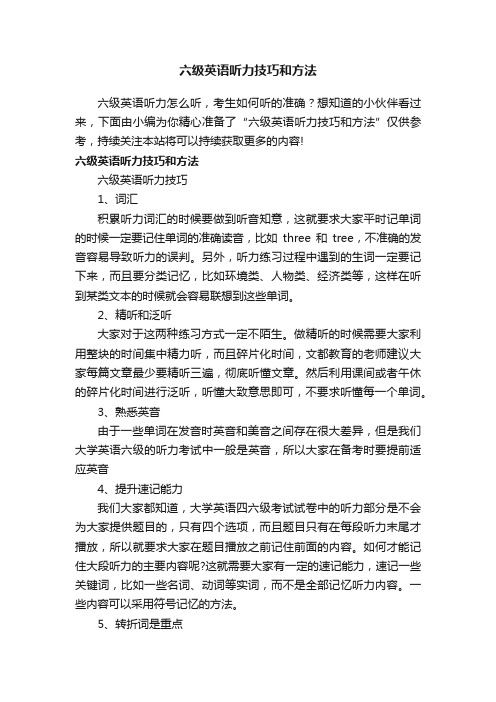
六级英语听力技巧和方法六级英语听力怎么听,考生如何听的准确?想知道的小伙伴看过来,下面由小编为你精心准备了“六级英语听力技巧和方法”仅供参考,持续关注本站将可以持续获取更多的内容!六级英语听力技巧和方法六级英语听力技巧1、词汇积累听力词汇的时候要做到听音知意,这就要求大家平时记单词的时候一定要记住单词的准确读音,比如three和tree,不准确的发音容易导致听力的误判。
另外,听力练习过程中遇到的生词一定要记下来,而且要分类记忆,比如环境类、人物类、经济类等,这样在听到某类文本的时候就会容易联想到这些单词。
2、精听和泛听大家对于这两种练习方式一定不陌生。
做精听的时候需要大家利用整块的时间集中精力听,而且碎片化时间,文都教育的老师建议大家每篇文章最少要精听三遍,彻底听懂文章。
然后利用课间或者午休的碎片化时间进行泛听,听懂大致意思即可,不要求听懂每一个单词。
3、熟悉英音由于一些单词在发音时英音和美音之间存在很大差异,但是我们大学英语六级的听力考试中一般是英音,所以大家在备考时要提前适应英音4、提升速记能力我们大家都知道,大学英语四六级考试试卷中的听力部分是不会为大家提供题目的,只有四个选项,而且题目只有在每段听力末尾才播放,所以就要求大家在题目播放之前记住前面的内容。
如何才能记住大段听力的主要内容呢?这就需要大家有一定的速记能力,速记一些关键词,比如一些名词、动词等实词,而不是全部记忆听力内容。
一些内容可以采用符号记忆的方法。
5、转折词是重点在很多听力内容中,前面的部分会铺垫大段的内容,而关键信息往往通过转折的方式引出来,因此需要大家掌握一些转折连词,比如but、however、nevertheless等。
六级英语听力注意事项1、听音之前的准备要有效利用题目选项进行预判断,包括推测题目内容和考查内容。
在看选项时,要做到以下三点。
一是竖看,确定相同之处。
二是横看,确定不同之处。
三是找出重复性高的词,这些词一般是与主题相关的词,具有路标的功能。
英语四级考试听力答题技巧

英语四级考试听力答题技巧在英语四级听力中,要想取得好的成果,把握肯定的技巧是必需的,那么有哪些英语四级听力技巧值得借鉴呢,不同的听力理解题型有不同的方法。
以下是我为大家整理的英语四级考试听力答题技巧,感谢您的观赏。
英语四级考试听力答题技巧1. 推理原则:一般需对对话进行推理,故直接在对话中听到的一般不是正确答案。
2. 挫折原则:通常要办的事情都是不顺当的(如买东西买不到,订房间客满等)3. 男女原则:一般男生比较衰,女生比较牛。
男生提出的观点女生都是不同意或有不同看法的,反之女生提出的观点男生都是同意和欣赏的。
男生的特征:脏、乱、差、铺张、穷、小气、不良习惯、迟钝、不顾家女生的特征:爱洁净、节省、富有、好学、能干、聪慧、大度、急躁、恋家、除数理化外成果都很好4. 父母一般只有一个作用教育子女好好学习5. 除了父母教育子女外,家里(包括伴侣家,阿姨家等等)发生的事情一般是不考的,故遇到地点推想题类似athome / at Mary’s home之类的选项一般都是不对的。
6. 四级听力短对话只考日常生活学习中遇得到事情,问题,故假如选项中消失一些日常生活中不太可能发生或很少发生的事情一般不会是正确选项英语四级听力复习方案凡事预则立不预则废,假如有了一个合理而可行的方案,并能仔细执行,那么我们离胜利又进了一步。
这个方案包括两点:合理性和可行性。
先说说合理性,这说的是必需依据自己的水平支配复习和考试,切不行操之过急。
比如我曾经在基础班里遇到过这样的同学,一个有些年纪的女同学在第一节课间上来问:老师,我报了两个月以后的雅思索试,我基础挺差的,不知道自己行不行。
我问她,你的基础有多差?她回答:我连23个字母都背不全。
我心里想,果真很差,至少应当知道英文是26个字母而不是23吧。
这样的水平明显是不适合参与雅思索试的,我只好劝她先提高一下,不要急着报考,考了也是铺张精力和金钱。
依据自身水平支配复习时间,不要赶鸭子上架的去考试,这就是合理性。
四六级听力技巧与答题技巧详解

四六级听力技巧与答题技巧详解听力作为英语四六级考试的重要部分,对于考生来说是一个相对难以应对的挑战。
因此,掌握听力技巧和答题技巧成为提高听力分数的关键。
本文将详细讲解四六级听力技巧和答题技巧。
一、听力技巧1. 预测题目内容:在听力开始前,快速浏览题目,理解问题的要求和重点,尝试预测答案的范围以及可能的关键词。
这样能帮助你更有针对性地聆听对话或短文,提高听力的准确性。
2. 注意关键词:关注对话或短文中的关键词,这些词通常是信息传递的核心点。
将注意力集中在关键词上,可以更好地理解和抓住重要信息。
3. 聚焦一致性:听力材料中的对话或短文通常会就同一个话题进行不同方面的描述。
将握住主题的思路,把握对话或短文中重复出现的内容和信息,从而更好地理解整个材料。
4. 注意声调和语气:正确理解对话者的语气和声调可以帮助你把握对话的情感和意图。
特别是在多人对话中,对话者的语气和态度往往能明显干扰或暗示某些信息。
5. 标记重点信息:听力过程中,合理使用笔记、缩写和图表等方法,将听到的重要信息及时记录下来。
这样不仅有助于加深印象和理解,而且能够在后面的题目中提供便利。
二、答题技巧1. 利用选项消减法:在选择题中,单选和多选题通常提供几个选项。
利用所学的听力技巧,将不符合条件的选项逐一排除,最终选出正确答案。
这样可以提高选择题的答题准确性。
2. 注意选项词序:很多听力选项的干扰性在于选项词的词序和原文不一致。
在做题过程中,注意选项词的变化和顺序,避免由于这种干扰导致选项选择错误。
3. 捕捉细节信息:许多听力题目要求考生拾取细节信息。
在听力过程中,注意捕捉细节信息的同时,确保不丢失整体大意。
4. 注意时间提示:听力材料中经常会提到具体的时间信息,例如日期、时间段等。
捕捉这些信息并在答题时有效利用,有助于提高答题的准确度。
5. 学会揣测答案:有时候,无法听清或者无法确定答案的情况下,可以学会根据前后文的逻辑关系和常识进行揣测。
四六级听力长对话解题技巧与方法
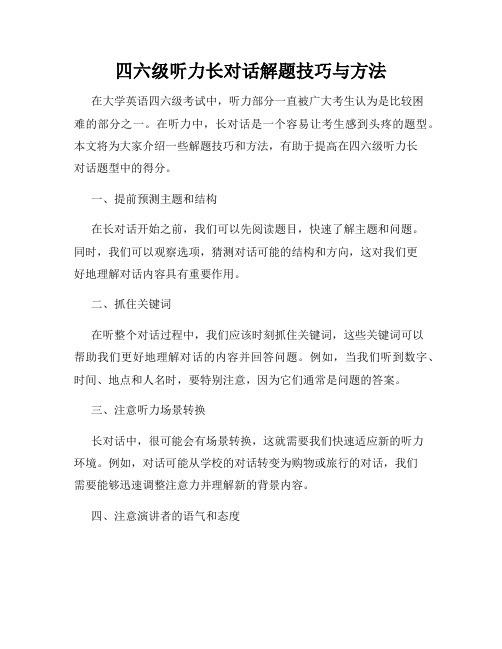
四六级听力长对话解题技巧与方法在大学英语四六级考试中,听力部分一直被广大考生认为是比较困难的部分之一。
在听力中,长对话是一个容易让考生感到头疼的题型。
本文将为大家介绍一些解题技巧和方法,有助于提高在四六级听力长对话题型中的得分。
一、提前预测主题和结构在长对话开始之前,我们可以先阅读题目,快速了解主题和问题。
同时,我们可以观察选项,猜测对话可能的结构和方向,这对我们更好地理解对话内容具有重要作用。
二、抓住关键词在听整个对话过程中,我们应该时刻抓住关键词,这些关键词可以帮助我们更好地理解对话的内容并回答问题。
例如,当我们听到数字、时间、地点和人名时,要特别注意,因为它们通常是问题的答案。
三、注意听力场景转换长对话中,很可能会有场景转换,这就需要我们快速适应新的听力环境。
例如,对话可能从学校的对话转变为购物或旅行的对话,我们需要能够迅速调整注意力并理解新的背景内容。
四、注意演讲者的语气和态度在长对话中,不同的演讲者可能会表达不同的观点和态度。
所以,要仔细倾听演讲者的语气和语调,并结合上下文来理解对话的情感色彩,这对回答与情感、态度相关的问题至关重要。
五、分段时间记笔记在长对话中,我们可以利用考试提供的笔记本记笔记。
我们可以根据对话的结构将对话的要点和关键信息记录下来,这可以帮助我们更好地回顾对话的内容,回答与细节相关的问题。
六、多听多练除了掌握一些解题技巧和方法外,多进行听力训练也是提高听力能力的重要方法。
我们可以利用一些听力材料进行模拟考试,如四六级真题、BBC新闻、TED演讲等,这样有助于我们熟悉不同场景和语速,提高听力反应速度和理解能力。
总结起来,要在四六级听力长对话中取得好成绩,考生需要提前预测主题,抓住关键词,注意听力场景转换,注意演讲者的语气和态度,分段时间记笔记,并进行多听多练。
通过不断的积累和实践,相信大家能够在听力长对话题型中获得更好的成绩。
以上是关于四六级听力长对话解题技巧与方法的简要介绍,希望对大家备考有所帮助。
英语四级考试听力答题技巧总结

2022英语四级考试听力答题技巧总结英语四级考试听力答题技巧总结1、短篇新闻答题技巧a:先了解新闻内容再去听新闻都具有时效性,因此就相关的内容进行搜索以自己熟悉的语言先大致了解新闻内容,通过对题目的预读大体了解新闻的内容。
b:养成良好的听力习惯大家不要因为一个词或者一个句子没有听懂而中断后续的思路,如果这样的听力习惯会导致整个内容的混乱与丢失。
因此切记不要在没有听懂的地方过于纠结与停留,因为一点内容没有听懂不会影响到整个*内容的听不懂,我们要学会抓大放小,学会放弃。
听不懂的地方整个听完后再回去反复听,要弄明白没有听懂的原因,可能是某个单词不认识;某个专业术语意思理解偏差;某个语法不明白导致句子意思无法理解;或者语速加快导致的;又或者是自己的不专心。
c:不要在乎特别难懂的人名或地名新闻中往往会涉及过多的人名或地名,我们在平时练习时不用过多识记,在考试中也不用被这些次要词妨碍,比如在某国家某小镇发生的爆炸事件,其中关键性的内容是爆炸事件,而发生的地点则不影响内容,在题目中也不会问及这些关于国家地点的问题。
d:尽快锁定大致内容抓住主题词新闻的主旨往往在首句处,因此前边内容要认真听清楚,往往一句话概括出内容,后边都是细节介绍。
所以要尽快地抓住*主旨。
主旨句往往含有内容关键词,比如bus explosion/US election race等等。
当然也会有Now in sports(现在进入体育新闻)....../Turn to the Middle East(现在转向中东地区)......等简单的呈现方式。
2、长对话的答题技巧两个长对话,长对话的答案一般也是从上面短对话的几个方面去考虑得出答案。
要注意的是,有时候同一个长对话里的不同问题,答案可能从不同的方面得出。
做这部分试题的时候,要注意以下几点:听音前,预读选项尽可能地把3或者4道试题的选项浏览一遍,根据选项猜测可能出现的问题及提问方式。
听音时,迅速抓住与选项及所猜测问题有关的关键词,速记有关内容或者在选项后面做记号,在有可能成为答案的选项后面做记号,在绝对没有可能成为答案的选项后面做记号,当然两种记号肯定应该不一样。
大学英语四级考试小技巧

大学英语四级考试小技巧
一、听力篇
1.训练听力速度:模拟考试情景,找一些题型较难的听力材料,尝试用较快的速度听,培养快速捕捉关键信息的能力。
2.注意常见听力词汇:关注常见听力词汇的同义替换或近义替换,这些词汇会在听力材料中频繁出现。
3.注意转折词语:转折词语是相对容易遗漏或理解错误的部分,需要重点留意。
4.多做听力练习题:通过大量练习,提高听力技巧和反应速度,熟悉常见题型。
二、阅读篇
1.提高阅读速度:切忌停顿和犹豫,多读英语原文、英语报纸、英语网站等,提高阅读速度。
2.训练阅读技巧:掌握快速阅读、浏览查找、略读、详读等技巧,根据不同题型采用不同的阅读方法。
3.多做题做文章:从了解题意到选答案的过程中,要认真阅读文章,尤其是题干前后的上下文,全面掌握文章内容。
4.积累常见单词和短语:多积累常见词汇和短语,提高阅读理解的准确性。
三、写作篇
1.熟练掌握常用句型和词汇:多积累、多记忆经典句型,灵活运用在写作中。
英语四级听力技巧和方法
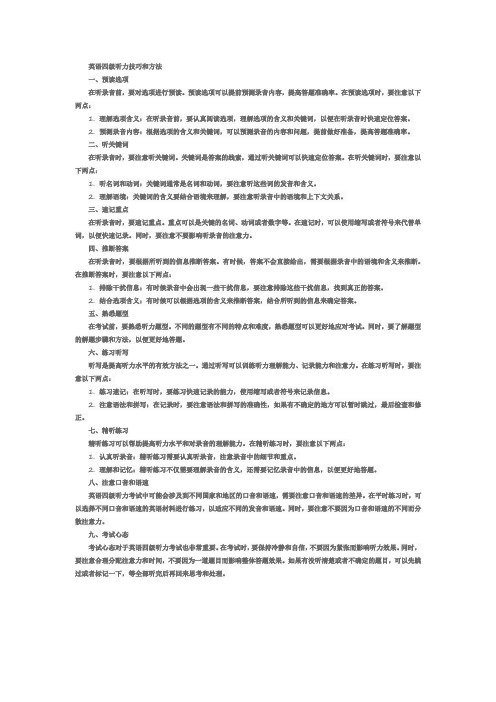
英语四级听力技巧和方法一、预读选项在听录音前,要对选项进行预读。
预读选项可以提前预测录音内容,提高答题准确率。
在预读选项时,要注意以下两点:1. 理解选项含义:在听录音前,要认真阅读选项,理解选项的含义和关键词,以便在听录音时快速定位答案。
2. 预测录音内容:根据选项的含义和关键词,可以预测录音的内容和问题,提前做好准备,提高答题准确率。
二、听关键词在听录音时,要注意听关键词。
关键词是答案的线索,通过听关键词可以快速定位答案。
在听关键词时,要注意以下两点:1. 听名词和动词:关键词通常是名词和动词,要注意听这些词的发音和含义。
2. 理解语境:关键词的含义要结合语境来理解,要注意听录音中的语境和上下文关系。
三、速记重点在听录音时,要速记重点。
重点可以是关键的名词、动词或者数字等。
在速记时,可以使用缩写或者符号来代替单词,以便快速记录。
同时,要注意不要影响听录音的注意力。
四、推断答案在听录音时,要根据所听到的信息推断答案。
有时候,答案不会直接给出,需要根据录音中的语境和含义来推断。
在推断答案时,要注意以下两点:1. 排除干扰信息:有时候录音中会出现一些干扰信息,要注意排除这些干扰信息,找到真正的答案。
2. 结合选项含义:有时候可以根据选项的含义来推断答案,结合所听到的信息来确定答案。
五、熟悉题型在考试前,要熟悉听力题型。
不同的题型有不同的特点和难度,熟悉题型可以更好地应对考试。
同时,要了解题型的解题步骤和方法,以便更好地答题。
六、练习听写听写是提高听力水平的有效方法之一。
通过听写可以训练听力理解能力、记录能力和注意力。
在练习听写时,要注意以下两点:1. 练习速记:在听写时,要练习快速记录的能力,使用缩写或者符号来记录信息。
2. 注意语法和拼写:在记录时,要注意语法和拼写的准确性,如果有不确定的地方可以暂时跳过,最后检查和修正。
七、精听练习精听练习可以帮助提高听力水平和对录音的理解能力。
在精听练习时,要注意以下两点:1. 认真听录音:精听练习需要认真听录音,注意录音中的细节和重点。
六级听力中的听力技巧与注意事项

六级听力中的听力技巧与注意事项六级听力作为英语六级考试的重要部分,对听力技巧和注意事项的掌握至关重要。
以下是一些有效的听力技巧和注意事项,帮助考生提高六级听力水平。
第一,预测题目内容。
在开始听力材料之前,快速浏览题目,注意关键词和题目类型。
通过预测,考生可以更好地理解听力材料的内容,并且能够更准确地回答问题。
预测题目内容也有助于提高听力的集中注意力。
第二,注意听力材料的开头和结尾。
通常,听力材料的开头和结尾会提供一些关键信息,有助于理解整个听力材料的主题。
因此,在开始听力部分时,考生需要特别关注这两个部分,并做好记录。
在结尾部分,有时会有与题目有关的重要提示。
第三,集中注意力在听力材料的具体细节上。
六级听力中,考生需要捕捉到听力材料中的具体细节,如时间、地点、人物、事件等。
将注意力集中在这些细节上,有助于更好地理解听力材料,并回答相关问题。
第四,练习听力材料的推理能力。
在听力过程中,有时听力材料并不会提供所有的细节,需要考生根据已知信息进行推理。
因此,考生需要不断练习推理能力,通过已知信息推测未提及的细节,为后面的问题做准备。
第五,注意听力材料中的词汇转化。
在六级听力中,考生需要注意词汇的转化。
例如,名词可能在听力材料中以动词的形式出现,或者以同义词的形式出现。
要做到这一点,考生需要通过大量的听力训练来熟悉不同词汇的表达方式。
第六,练习听力材料的快速笔记。
在听力过程中,考生应该尝试做一些简洁但有效的笔记,比如关键词、数字、地点等。
这样可以帮助考生记忆听力材料的关键信息,方便后面的答题。
第七,练习听力材料的整体理解能力。
除了捕捉听力材料中的细节,考生还要有整体理解能力。
通过练习,考生可以提高对听力材料整体内容的把握,抓住主题和关键信息。
第八,多样化听力材料的练习。
六级听力涉及多种题材,包括讲座、对话、新闻报道等。
考生应该通过多样化的听力材料练习来提高自己的听力水平。
可以利用教材、在线听力资源和相关应用程序进行练习。
2024大学英语六级听力技巧策略

2024大学英语六级听力技巧策略1.2024大学英语六级听力技巧策略篇一1、学会抓关键词在听力过程中,我们要学会抓其中的关键词。
在语段之间的停顿时间,快速浏览选项,对比其不同之处,在听的过程中通过关键词判断说话者的身份,帮助自己搜索相关背景知识。
2、学会划分意群很多人在听的时候都是逐个单词地听,想要听懂每一个单词。
其实这样做是没有必要的,也是很难做到的。
因此,我们要学会划分意群来听,分词组分词块来听会帮助你节省很多时间,并能让你更快地理解句子是什么意思。
3、学会提前思考在听力开始之前,你就要浏览完材料,结合选项开始思考。
这段话要讲什么,目的又是什么。
并学会猜测,包括对话题的预测、甚至通过常识进行答案的预测。
这样才能在考试之中处于主动的位置,所以,听听力要积极主动。
4、学会做笔记好的笔记能够让你的思路清晰,让你了解听力内容的结构。
在听力的开头结尾时就要集中精神,记住相关信息,因为那很有可能就是听力的重点。
有时考点在出题时是按照顺序来出的,因此笔记能帮助我们排除一些干扰选项。
5、学会注意数字要注意以下几方面:常规数字的连读,百分数,分数,小数,百分比,电话号码,航班号,驾照号,信用卡号等等。
2.2024大学英语六级听力技巧策略篇二1、总原则:听前看选项,带着问题去听,听得时候要学会抓重点。
2、边听边记笔记或者边听边做题。
利用每一个小问题之间的间隔时间,大概有13秒左右,可以根据关键信息,做题。
3、只要听到可以确定答案的题目就不用听问题了,直接选。
4、听力篇章文章中重复率很高的词汇或者概念一般就是短文的主题,听到什么就选什么。
3.2024大学英语六级听力技巧策略篇三每天坚持听1套真题听力,每次大概30分钟左右,至少要听3遍:第1遍:先听,做题。
先把答案选出来,不确定的题就先做个记号,分析时可以重点听。
第2遍:对答案,分析错题。
重点听刚刚标注的地方,直到听懂意思,分析干扰选项,可以直接把错题原因拿红笔写在题旁边。
四六级听力考试常见难点及解决策略

四六级听力考试常见难点及解决策略四六级听力考试是中国大学英语教学委员会组织的一项重要考试,测试考生对英语听力的理解和应用能力。
然而,许多考生在这项考试中遇到了各种困难。
本文将探讨四六级听力考试中常见的难点,并提出相应的解决策略。
一、听力材料过快听力材料的语速是许多考生面临的首要难点之一。
在听力过快的情况下,考生可能会跟不上材料的节奏,导致听力理解受阻。
解决策略:1. 提前训练:在考前,考生可以通过听英语电台、广播或者参加听力训练班来提前适应快速的语音节奏。
2. 多练习听力材料:通过大量练习真题和模拟试卷,提高自己的听力反应速度和理解能力。
3. 增加听力接触:平时多听英语歌曲、英语电影等,提高对英语语音的敏感度和适应能力。
二、生词和短语理解困难四六级听力中经常出现各种生词和短语,这给考生造成了阅读障碍,使他们对整段对话或文章的理解受限。
解决策略:1. 预先了解话题:在考前,考生可以通过查找相关资料了解可能出现的话题,并抓住关键词来猜测生词的含义。
2. 利用上下文:结合上下文可以帮助理解生词和短语的意思,通过理解句子的语义来推测未知词汇的含义。
3. 多积累词汇:平时要多积累常见的英语生词和短语,通过词汇量的积累来提高在听力中的应用能力。
三、语音变调和连读现象英语语音的变调和连读现象常常使得听力理解变得困难,特别是对于非母语人士来说。
解决策略:1. 学习标准发音:通过学习英语的基本发音规则,如清晰发音、重音规律等,提高对语音变调和连读的识别能力。
2. 多听真实语音材料:多听英语广播、英语电影等,培养对语音变调和连读的敏感度。
3. 利用字幕:观看英语电影或视频时,可以打开字幕,帮助理解和准确抓住语音变调和连读现象。
四、听力策略不当许多考生在四六级听力中没有有效的听力策略,导致失去了宝贵的答题时间。
解决策略:1. 预测问题:在开始听材料之前,先读题目,预测可能出现的答案范围,有针对性地听取关键信息。
2. 筛选答案:听材料时,注意排除干扰项和无关信息,集中注意力寻找与问题相关的答案。
英语六级听力技巧大全

英语六级听力技巧大全
1.改变听音方式
传统的听音方式是按照句子的结构和逻辑来理解,但是在英语六级听力中,常常会遇到较长的干扰信息或者词汇难度较高的问题。
这时候,可以尝试改变听音方式,将注意力集中在关键词上,忽略干扰词,并尝试通过上下文的暗示来帮助理解。
2.提前预测
在听力开始之前,先浏览一下听力材料的主题,了解大概的内容。
然后,在开始听录音之前,尝试预测将要听到的内容。
这样可以帮助学生更好地集中注意力,并更快地理解听力内容。
3.练习听取关键信息
4.学会区分细微差别
在英语六级听力中,常常会出现近义词、反义词等细微差别。
学生要学会区分这些细微差别,并在听到这些差别时做好标记。
这样一来,在回答问题时就不会混淆。
5.利用上下文信息
有时候在听力材料中,一些单词听不清楚或者不认识,可以通过上下文的暗示来猜测其意义。
同时,上下文还可以提供其他信息,帮助理解整个句子的意义。
6.注意连读和语调
7.练习速度和准确度的平衡
在英语六级听力中,学生常常为了听完全文而忽略了理解的准确度,或者为了准确理解每个单词而放慢了速度。
学生要练习找到速度和准确度的平衡,既要尽可能快速地听完录音,又要保持对内容的准确理解。
以上是一些英语六级听力技巧。
通过不断练习和积累听力经验,学生可以逐渐提高听力能力,更好地应对英语六级听力考试。
英语六级听力技巧
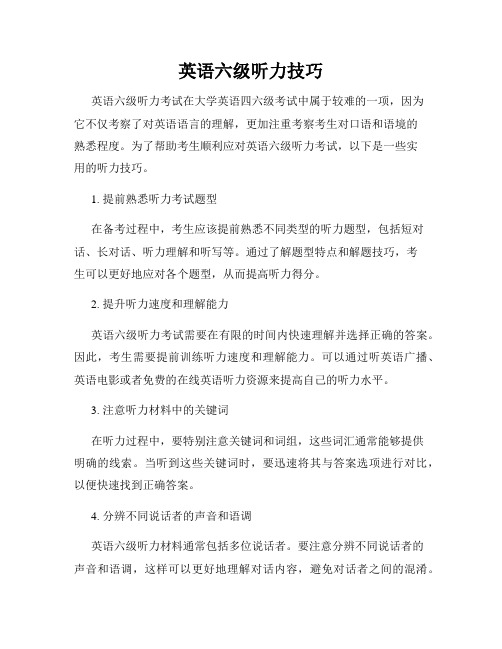
英语六级听力技巧英语六级听力考试在大学英语四六级考试中属于较难的一项,因为它不仅考察了对英语语言的理解,更加注重考察考生对口语和语境的熟悉程度。
为了帮助考生顺利应对英语六级听力考试,以下是一些实用的听力技巧。
1. 提前熟悉听力考试题型在备考过程中,考生应该提前熟悉不同类型的听力题型,包括短对话、长对话、听力理解和听写等。
通过了解题型特点和解题技巧,考生可以更好地应对各个题型,从而提高听力得分。
2. 提升听力速度和理解能力英语六级听力考试需要在有限的时间内快速理解并选择正确的答案。
因此,考生需要提前训练听力速度和理解能力。
可以通过听英语广播、英语电影或者免费的在线英语听力资源来提高自己的听力水平。
3. 注意听力材料中的关键词在听力过程中,要特别注意关键词和词组,这些词汇通常能够提供明确的线索。
当听到这些关键词时,要迅速将其与答案选项进行对比,以便快速找到正确答案。
4. 分辨不同说话者的声音和语调英语六级听力材料通常包括多位说话者。
要注意分辨不同说话者的声音和语调,这样可以更好地理解对话内容,避免对话者之间的混淆。
5. 理解上下文和语境信息除了关键词外,上下文信息和语境也对正确理解听力材料很重要。
通过理解对话的背景、环境和说话人的意图,可以帮助考生更准确地选择答案。
6. 练习做笔记和快速扫读在听力考试过程中,考生可以尝试做笔记来帮助记忆关键信息。
同时,还可以练习快速扫读选项,迅速找到与听力内容相符的答案。
7. 多做模拟题和真题练习为了熟悉考试形式和提高听力技巧,考生可以多做模拟题和真题练习。
这样不仅可以更好地了解考试要求,还可以通过反复练习提高听力技巧和应对考试的信心。
总之,英语六级听力考试需要考生在一定时间内快速理解并选择正确的答案。
通过提前准备、熟悉题型和不断练习,考生可以逐渐掌握有效的听力技巧,从而在考试中获得较高的得分。
希望以上提供的技巧能够对考生在英语六级听力考试中有所帮助。
英语四级考试中听力四大法则
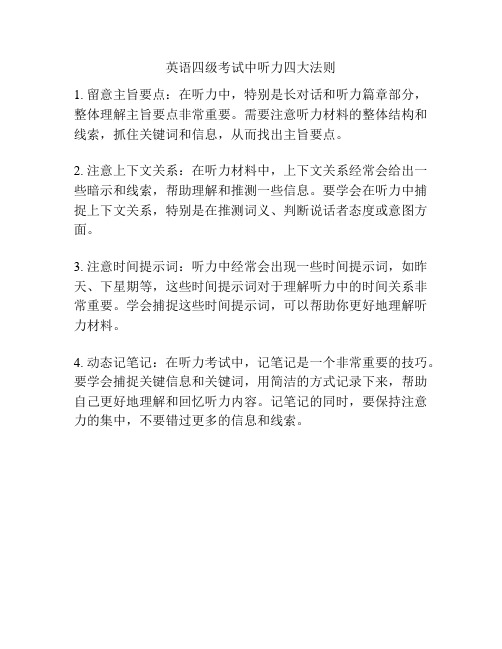
英语四级考试中听力四大法则
1. 留意主旨要点:在听力中,特别是长对话和听力篇章部分,整体理解主旨要点非常重要。
需要注意听力材料的整体结构和线索,抓住关键词和信息,从而找出主旨要点。
2. 注意上下文关系:在听力材料中,上下文关系经常会给出一些暗示和线索,帮助理解和推测一些信息。
要学会在听力中捕捉上下文关系,特别是在推测词义、判断说话者态度或意图方面。
3. 注意时间提示词:听力中经常会出现一些时间提示词,如昨天、下星期等,这些时间提示词对于理解听力中的时间关系非常重要。
学会捕捉这些时间提示词,可以帮助你更好地理解听力材料。
4. 动态记笔记:在听力考试中,记笔记是一个非常重要的技巧。
要学会捕捉关键信息和关键词,用简洁的方式记录下来,帮助自己更好地理解和回忆听力内容。
记笔记的同时,要保持注意力的集中,不要错过更多的信息和线索。
英语四级听力十大答题技巧
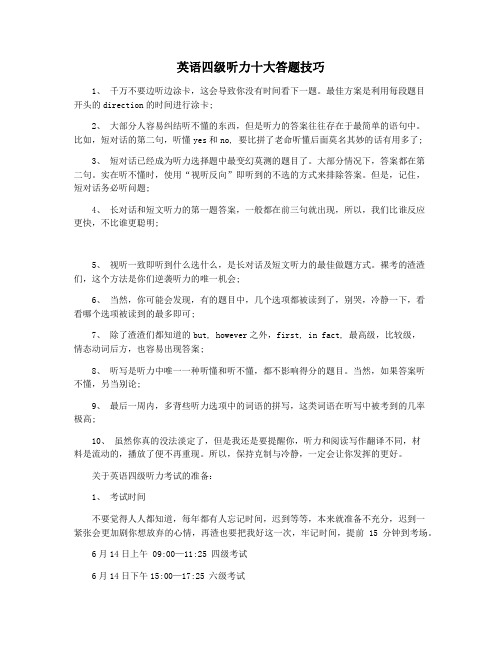
英语四级听力十大答题技巧1、千万不要边听边涂卡,这会导致你没有时间看下一题。
最佳方案是利用每段题目开头的direction的时间进行涂卡;2、大部分人容易纠结听不懂的东西,但是听力的答案往往存在于最简单的语句中。
比如,短对话的第二句,听懂yes和no, 要比拼了老命听懂后面莫名其妙的话有用多了;3、短对话已经成为听力选择题中最变幻莫测的题目了。
大部分情况下,答案都在第二句。
实在听不懂时,使用“视听反向”即听到的不选的方式来排除答案。
但是,记住,短对话务必听问题;4、长对话和短文听力的第一题答案,一般都在前三句就出现,所以,我们比谁反应更快,不比谁更聪明;5、视听一致即听到什么选什么,是长对话及短文听力的最佳做题方式。
裸考的渣渣们,这个方法是你们逆袭听力的唯一机会;6、当然,你可能会发现,有的题目中,几个选项都被读到了,别哭,冷静一下,看看哪个选项被读到的最多即可;7、除了渣渣们都知道的but, however之外,first, in fact, 最高级,比较级,情态动词后方,也容易出现答案;8、听写是听力中唯一一种听懂和听不懂,都不影响得分的题目。
当然,如果答案听不懂,另当别论;9、最后一周内,多背些听力选项中的词语的拼写,这类词语在听写中被考到的几率极高;10、虽然你真的没法淡定了,但是我还是要提醒你,听力和阅读写作翻译不同,材料是流动的,播放了便不再重现。
所以,保持克制与冷静,一定会让你发挥的更好。
关于英语四级听力考试的准备:1、考试时间不要觉得人人都知道,每年都有人忘记时间,迟到等等,本来就准备不充分,迟到一紧张会更加剧你想放弃的心情,再渣也要把我好这一次,牢记时间,提前15分钟到考场。
6月14日上午 09:00—11:25 四级考试6月14日下午15:00—17:25 六级考试2、考场路线最好提前一天现场勘查,即使懒得去,那也一定要搞清楚路线,哪栋楼,哪个教室,大概要花多长时间走到,不要觉得可能是学校天天都走熟的不能再熟,万一当天施工、这那啥的,考前稍微上点心就能避免的,没必要因为小事闹心影响本来就不怎么样的考试心情。
英语四级听力长对话解题技巧
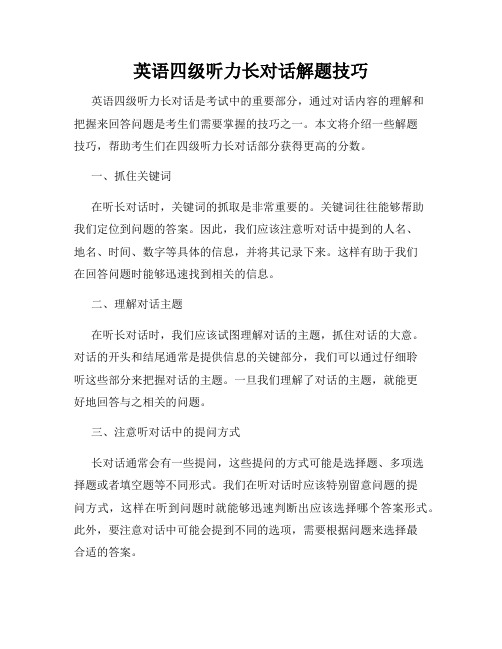
英语四级听力长对话解题技巧英语四级听力长对话是考试中的重要部分,通过对话内容的理解和把握来回答问题是考生们需要掌握的技巧之一。
本文将介绍一些解题技巧,帮助考生们在四级听力长对话部分获得更高的分数。
一、抓住关键词在听长对话时,关键词的抓取是非常重要的。
关键词往往能够帮助我们定位到问题的答案。
因此,我们应该注意听对话中提到的人名、地名、时间、数字等具体的信息,并将其记录下来。
这样有助于我们在回答问题时能够迅速找到相关的信息。
二、理解对话主题在听长对话时,我们应该试图理解对话的主题,抓住对话的大意。
对话的开头和结尾通常是提供信息的关键部分,我们可以通过仔细聆听这些部分来把握对话的主题。
一旦我们理解了对话的主题,就能更好地回答与之相关的问题。
三、注意听对话中的提问方式长对话通常会有一些提问,这些提问的方式可能是选择题、多项选择题或者填空题等不同形式。
我们在听对话时应该特别留意问题的提问方式,这样在听到问题时就能够迅速判断出应该选择哪个答案形式。
此外,要注意对话中可能会提到不同的选项,需要根据问题来选择最合适的答案。
四、利用上下文信息在听长对话时,我们可以利用对话中提供的上下文信息来理解对话内容。
有时候,对话中的某些句子可能不太容易理解,但通过上下文的线索,我们可以推断出这些句子的意思。
因此,要善于充分利用上下文信息来帮助我们理解对话的细节和推断出正确的答案。
五、多听多练英语四级听力长对话的解题技巧需要通过多听多练来掌握。
通过多次听长对话,我们能够熟悉对话的形式和题型,提高对话内容的理解和把握能力。
可以选择一些模拟题来进行练习,这样能够更好地了解自己在听长对话方面的薄弱点,并有针对性地进行提高。
六、注意时间管理在英语四级听力长对话部分,时间是有限的。
因此,我们要注意控制好答题的时间。
如果遇到某个问题无法立即得出答案,可以暂时跳过,继续往下听,争取在限定的时间内完成更多的题目。
然后再回过头来仔细思考这些未作答的问题,尽可能争取更多的得分机会。
四级英语考试答题技巧

四级英语考试答题技巧1.听力部分-提前预览选项:在听力开始前快速浏览题目及选项,了解对话或短文的主题和可能涉及的内容。
-抓住关键词:关注问题中的关键词以及选项中的信号词,如转折连词、最高级形容词、数字等。
-记笔记:对于长篇段落或讲座类题目,可以适当做笔记记录关键信息点。
2.阅读理解-快速阅读文章:先粗略浏览全文,掌握大意和结构。
-定位法解题:根据题目所给的信息回原文定位查找答案,通常答案会出现在与题目相关联的句子附近。
-排除法解题:当不能直接确定正确答案时,通过排除明显错误选项缩小选择范围。
3.完形填空-结合上下文推断词义:依据文章前后语境判断单词或短语的含义和用法。
-语法分析:注意句中动词时态、主谓一致、固定搭配等语法结构来选择正确答案。
4.翻译部分-把握整体意思:首先通读整个句子,理解汉语句子的大致含义。
-拆分重组:将复杂的汉语句子拆分成几个简单句或短语,分别进行翻译后再组合成符合英语表达习惯的句子。
-词汇运用:尽量使用学过的专业词汇和高频词汇,避免逐字直译,确保翻译后的句子通顺且准确。
5.写作部分-审题明确:仔细阅读写作要求,明确主题和写作任务。
-构思提纲:在草稿纸上列出文章的基本框架和要点,包括开头引入、主体论述和结尾总结。
-合理分配时间:保证有充足的时间进行书写,注意首尾段的撰写,保持卷面整洁,减少语法和拼写错误。
6.时间管理-合理安排时间:每部分试题都有对应的时间分配策略,严格控制各部分答题时间,避免因某一题耗时过多而影响全局。
7.其他注意事项-检查答案:若有剩余时间,应仔细检查已答题目,尤其是选择题是否涂卡无误。
-保持冷静:遇到难题不要慌张,可先跳过继续下一题,待完成所有题目后如有时间再回头解答。
英语四级考试中听力四大法则

英语四级考试中听力四大法则
英语四级考试中的听力部分有四大法则,分别如下:
1.听和写相结合:只靠听是记不牢的,俗话说:好记性不如烂笔头。
听力考查的一个重要方面是瞬间记忆和速记的能力,这种能力主要就是体现在耳朵到手写的转化过程中,当你把你听到的东西落实在字面上你就会加深印象,从而起到事半功倍的作用。
2.连读和略读要了解:在英语中连读和略读的情况经常会发生,如果你对连读和略读不够了解,那么你的听力也就会变得一头雾水。
3.泛听精听相结合:想要练习英语听力仅仅泛听是不够的。
它只是量的积累,是一个准备过程,为你打下了坚实的基础;想要让自己的听力突飞猛进,只有在精听之后,听力才能有质的飞跃。
4.掌握答题技巧:在考试中,考生在听力时需要掌握一定的答题技巧。
比如,考生可以在听音前先浏览题目,根据题干中的信息进行联想,猜测可能听到的内容;在听音时注意把握关键词和语调,及时做好笔记;听完之后也需要及时核对笔记,查漏补缺。
英语六级听力考试答题技巧(7篇)

英语六级听力考试答题技巧(7篇)英语六级听力考试答题技巧篇21.相关保存原则当选项中有两项表达意思相近时,那么正确答案必在这两项之中,这时只需略微听一听对话,即可知答案。
假如消失了双重相关,便可直接确认正确选项,只需听完对话加之认证一下即可。
2.异项保存原则当选项中消失有意思明显相反的两项时,那么正确答案必在此二项中消失,假如消失双重异项。
那么即可推断出正确答案,异项保存原则。
在六级考试听力短对话中应用广泛。
3.女士保存原则做题做多了,我们应当了解西方人的思维方式,当对话中消失女士的建议和要求时,我们肯定要留意这时女士说出来的话,很可能就是正确选项的异意,由于女士常常以女神的形象出面,她们代表的是美妙、正面、阳光的信息!4.概括、抽象保存原则当选项中消失比较概括、抽象的句子时,我们就要把表述事实的、详细的句子划掉而去选择表概、抽象、比较性的句子,此原则可衍生出一个包含取大的原则,在作题时应用也是非常的广泛,一般当两个选项的意思接近时,表述比较全面的一般为正确选项。
5.看法和虚拟保存原则这两种方法一般无单独命题的规律性,只是作为上述四种宏观方法的帮助方法消失。
当只剩下两个选项时,通常正看法的选项简单是正确答案,表虚拟的选项更简单是正确答案。
英语六级听力考试答题技巧篇3对于听力部分,个人认为,你把前面年份的听力都听懂、摸熟了,等到的分数,基本就是你今年能拿的分数了。
考试复习时间所剩无几,基于复习时间已经很有限,目前的重点应当是8套左右的真题,年月太久远了也没用。
争取每做一套,提高2-3分左右。
这个提高是基于技巧和对阵题的感觉的.把握上的,基本上,到了这个阶段,听力是不大可能有很大的提高。
因此不要奢望最终两周突然爆发式的得分。
需要留意的仅仅是是技巧,以及中间部分对出题者思路的把握。
对于听力部分,个人认为,你把前面年份的听力都听懂、摸熟了,等到的分数,基本就是你今年能拿的分数了。
所以,每天花半个小时自测或者自测后晚上自己再听几遍,基本就不需要再花什么功夫了。
四六级听力常见题型解析
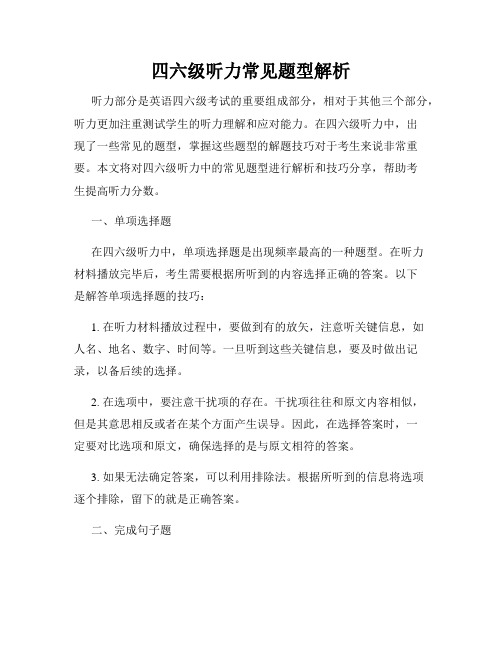
四六级听力常见题型解析听力部分是英语四六级考试的重要组成部分,相对于其他三个部分,听力更加注重测试学生的听力理解和应对能力。
在四六级听力中,出现了一些常见的题型,掌握这些题型的解题技巧对于考生来说非常重要。
本文将对四六级听力中的常见题型进行解析和技巧分享,帮助考生提高听力分数。
一、单项选择题在四六级听力中,单项选择题是出现频率最高的一种题型。
在听力材料播放完毕后,考生需要根据所听到的内容选择正确的答案。
以下是解答单项选择题的技巧:1. 在听力材料播放过程中,要做到有的放矢,注意听关键信息,如人名、地名、数字、时间等。
一旦听到这些关键信息,要及时做出记录,以备后续的选择。
2. 在选项中,要注意干扰项的存在。
干扰项往往和原文内容相似,但是其意思相反或者在某个方面产生误导。
因此,在选择答案时,一定要对比选项和原文,确保选择的是与原文相符的答案。
3. 如果无法确定答案,可以利用排除法。
根据所听到的信息将选项逐个排除,留下的就是正确答案。
二、完成句子题完成句子题是四六级听力的另一种常见题型,考生需要根据所听到的内容,补充或者完成句子中的空缺部分。
以下是解答完成句子题的技巧:1. 针对此类题目,考生需要在听的过程中注意主语、动词、宾语等关键词,以便准确填写空缺的内容。
2. 同样,注意干扰项的存在,在填空时要排除不符合原文意思的选项。
3. 如果在规定时间内无法确定答案,可以先选择一个似乎符合逻辑的选项。
三、判断正误题判断正误题是四六级听力中的另一常见题型,考生需要根据所听到的内容判断给出的句子是否与原文相符。
以下是解答判断正误题的技巧:1. 重点关注否定词和强调词。
否定词和强调词在句子中具有特殊的作用,往往与句子的意思密切相关,因此要对这些词语特别关注。
2. 注意听到的关键信息是否与题目相符。
如果听到与题目相反的内容,那么答案就是错误的;如果听到与题目相符的内容,那么答案就是正确的。
3. 确定答案时,要将选项与原文进行逐个对比,不要忽略细小的差异。
- 1、下载文档前请自行甄别文档内容的完整性,平台不提供额外的编辑、内容补充、找答案等附加服务。
- 2、"仅部分预览"的文档,不可在线预览部分如存在完整性等问题,可反馈申请退款(可完整预览的文档不适用该条件!)。
- 3、如文档侵犯您的权益,请联系客服反馈,我们会尽快为您处理(人工客服工作时间:9:00-18:30)。
大学英语四六级考试听力理解答题技巧探讨提高听力理解的成绩不仅要掌握基础语言技能,同时也要注意熟悉题型,掌握一些答题技巧。
答题技巧有别于语言知识,可在短时间内掌握。
甚至在听不懂题目内容情况下,也可根据其做出准确判断,选出正确答案。
1.对话部分对话部分一般均为日常会话,口语性强。
要求学生理解对话的主题、人物关系、时间、地点、主要情节等。
因此不仅要听懂单个句子的独立意义,还要听懂对话双方话语中所隐含的意思,并结合语气、语调、习语等各因素去理解对话的内容。
主要应掌握下列技巧:(l)抓住关键词,从而做出正确的判断;(2)熟悉题型的各种提问形式;(3)注意第二说话人的讲话语气;(4)注意but,because和so等词引导的句子;(5)熟记有关日常生活等话题方面的词语;(6)掌握常用词、词组和习语。
答题时,注意对对话中关键词或线索词的判断,有时无须听懂整个句子或对话的连贯意思,听清几个独立的线索词就能解题。
对话中往往含有一些表示时间、距离、速度、价格等的数字,这些数字在意思上相同或相似,要求学生听清双方对话,排除近似的干扰,听清问题所问的时间,找出原对话中表达正确概念的答案或通过简单计算,确定正确答案。
听音前,先浏览选择项预测对话的主题和问题;听音时,注意捕捉与选项有关的信息词,做出正确的选择。
短对话听力口决短文对话要牢记,一般解题需推理。
(一般短对话要推理,直接出现的不一定是正确的。
)人生难免遇挫折,通常办事不顺利。
(一般短对话中要做的事情往往不顺利,总有波折。
)男女各自有特色,阴盛阳衰是规律。
(男生总是很差,浪费钱,有不良习惯等,女生大都爱干净,学习好,性格好。
)可怜天下父母心,重点都是抓教育。
(一般短对话中父母常常针对子女学习。
)生活学习常会考,古怪事情不考虑。
(短对话通常考生活及学习中常遇到的事情。
)短文对话有场景,一般思路要清晰。
(短对话中常包含有不同场景,针对不同场景,思路常不一样。
)生活当中遇麻烦,借钱借物特别难。
(短对话中如果借某东西,通常不会很容易借到或者根本借不到。
)严师总能出高徒,通宵熬夜不怕苦。
(短对话中出现老师常有高要求,而学生做作业通常要花比预期更多的时间。
)论文通常要修改,严重一点就重来。
(短对话中,如果有论文或者作业,通常不容易按时完成。
)如果遇到有讲座,内容一般都无聊。
(短对话中,出现有讲座,通常观众不会从头听到尾,要么睡觉,要么不开心。
)车船从来不按时,时间一定要记好。
(短对话中,乘坐交通工具,通常不准时。
一定要记好时间。
)事故灾难不用怕,死里逃生有诀窍。
(短对话中出现事故,一般死不了人。
总是有出人意料的事情发生。
)生病如需去医院,切记提前要预约。
(中美文化差异,事事都要提前约。
)生活当中要买票,基本都是买不到。
(短对话中出现买票,订房,一般很难如意。
)对话虽短别大意,关键记住易答题。
(短对话中也要注意记笔记。
特别留意时间,关系,地点,数字,电话号码等。
)(短对话中出现被邀请,先感谢后拒绝)2.短文部分虽然短文的内容涉及面广,但测试重点具有一定的规律,可概括为:(l)掌握短文的主题或中心思想;(2)综合记忆短文中的事实和理由;(3)通过所给信息判断人物的身份及相互间的关系;(4)记住事情发生的时间和地点;(5)依据字面意思,推断出隐含信息;(6)领会说话人对所谈内容的观点和态度;(7)根据所给的数字,准确地进行计算等。
应试时注意的问题。
(l)预览选项。
充分利用正式听短文前的时间,将选项预览一遍。
预测短文的内容以及提问形式。
(2)抓主题句。
听音过程中,抓住主题句,就容易掌握文章的中心思想。
要特别注意听清开头和结尾的一两句话,因为开头句与结尾句常常是主题句。
还有一种情况是首尾两部分的几句话相结合,共同作为文章的主题。
只要了解这些结构安排,文章的主题句就容易抓住,短文中的详情细节、论据等就容易理解。
(3)记录事实。
考生在预览选项之后,大体已预测到题目的要求。
在听音过程中,要有目的地去抓听、记录与题目有关的事实,例如时间、地点、人物等。
(4)抓住信息词。
一些连接短文各个句子、表明上下逻辑关系的词,对短文内容如何发展,起到信号指示作用,对理解短文非常重要。
抓住这些信号,对于下文会讲什么内容、能解答什么问题就会心中有数,对短文逻辑关系更清楚。
这些词大致有:and, also, in addition, for example;but,however,in spite of,on the contrary;because,since,as a result;first,second,last,before,after,then,accordingly等。
(5)学会推断。
记录事实和抓住信息词是听力考试中不可缺少的。
但是,有些题目的作答,不仅需要事实,而且要根据这些明示信息和录音的字里行间进行综合推断。
这类题目比明示信息题目难得多。
(6)听清问题。
解题是听短文的目的,亦即听短文就是为了回答短文后的问题。
若是听不清所问的问题,就会答非所问,前面的全部工作就会功亏一篑。
所以,听清短文后的问题是解题的关键。
短文类型及解题思路短文常分七类:1.学校重点:学校的地理位置,校园环境,师生情况,课程情况,课外活动,学校特色2.组织机构重点:地点,规模,制度3.社会热点重点:背景,大众观点,作者态度4.灾难题重点:问题类型,起因,危害,解决方法5.新闻题重点:时间,地点,人物,起因,结果6.人物题重点:出生年月,出生地,成就,经历,结局7.科普题重点:物体特征,形成原因,分类,研究发现和初步结论解题思路:1.听什么就是什么。
2.重读或重复即是重点。
3.听清每段首尾句。
4.有原因出现,目的是考点。
5.有转折,转折部分是考点。
6.遇离奇故事,结局常意料之外,情理之中。
注意观察选项:1.常用同义词或词组表达原文含义。
2.换不同表达方式表达同样的意思。
3.选项表达与原文相反,但意思一样。
短文中的标志词:1.最高级标志词形容词、副词最高级、most / chief / primary / main / leading / ……2.唯一级标志词only / unique / prefer / every / one / of all / perfect / ……3.因果项标志词cause / lead to / contribute to / thanks to / owing to / question / answer / why / reason / 其他形式的问句/ ……4.转折项关键词despite / in spite of / instead / while / from ~ to ~ / although ~ (yet)~ / not only ~ but also ~ / ……5.序数项标志词所有的序数词(first , second)/ another / the other / next / last / in addition / on the other hand / ……6.时间项标志词when / how / today / as / before / after / since / then / until / ……7.解释项标志词or / namely / in other words / that is / that is to say / ……8.总结项标志词all in all / in brief / to conclude / at last / in summary / in short / ……9.强调项标志词副词:especially / particularly / almost / always / usually / ……动词:show / remember / note / notice / say / pronounce / ……3.听写填空掌握如下要点。
(l)预读须先行。
听题目录音之前,可利用录音中播放做题要求的时间,预读试题册上提供的书面文字了解短文的大意。
这是解题的前奏。
(2)第一遍录音播放时,尽量对短文形成一个整体印象。
搞清楚每个空格所填内容是一个句子还是句子的一部分。
在不影响全文听音的前提下,可以顺手填上有把握的空格。
(3)辨音问题。
同音词和近音词是听音中常见的。
如果不及时辨音,会影响考生做题的准确性,造成失分。
因此,必须明确同音词和近音词的异形及异义,根据上下文确定词义,填入正确的词。
(4)速写、速记,有助于解题。
听写填空要求既听又写,听写一个句子或句子的一部分不同于听写一个单词。
所以,在第一遍听音时,可以用速写、速记法,记录空格中的部分信息,可先填入空格中的第一个词或前两三个词,前提是不影响全文的听音。
在第二遍听音时,补足其余部分,这样会节省些时间。
4.复合式听写“复合式听写”内容较多,要求在有限的时间内,根据所听内容进行归纳、总结、再用原文或自己的话表述出来。
这一要求大大高于单词或短句的听写。
因此,在第一遍听音时,考生应在不影响全文听音的前提下,尽量将重要的内容记录下来,便于之后的归纳、总结。
由于时间紧张,记录可采用速写、速记、简写、缩略等各种既省时又达意的方法。
在听懂短文大意义的基础上,第二遍听音时,可以借助第一遍记录的内容归纳、总结,尽快地把所要写的句子用自己的话表述出来。
句子写出后,利用第三遍听音,核查一下所写的句子是否表达准确,有无语法错误,如字母大小写、名词单复数、主谓一致、动词时态的统一、冠词的运用等。
只有通过大量的练习和知识的积累,总结出更多的适合自己的行之有效的解题之法,才能真正提高听力理解能力。
复合式听写注意的问题:1.单词听写注意词性,单复数,时态变化。
2.后三句要强调速记。
一、抓句子关键词,二、长单词可简写,如写前三字母,词组可用单词首字母大写代替(break up=B U)三、合理运用符号代替。
3.后三句必须要写完整句子。
写清大意即可,切勿只写零星单词。
复合式听写易错点及答题技巧一、历年出现的单词拼写容易出错的地方:1大小写问题:专有名词,句子开头2单词各音节间的辅音字母注意是否双写。
success, process, necessary, recommend.3一个音节之中注意元音的拼写。
4注意不发音的字母:island, exhausted, comb.5检查词尾的变形1)名词:单数,复数,所有格非谓语动词与谓语动词(ed,ing,s)形式,填原型的很少见。
2)形容词注意比较级以及以al结尾的形容词。
natural.personal.emotional.artificial.additional,3)副词结尾的ly wholly, completely,emotionally.二、句子听写:同义替换写难题①词汇层面上的同义替换:1)I’ve got to go over my notes for tomorrow’s midterm.(study)2)We’ll have to leave very early.(set off)3)It looks like he bought out the bookshelf.(bought a lot of books)4)Jane is counting the days to go home for the summer.(is eager to)5)There’ll be another bus in two or three minutes.(soon)②句子层面上的同义替换1)You can use my new car if you drive it carefully.I agree to lend you my new car.2)The teacher went over last Friday’s lesson today.The teacher reviewed a previous lesson today.3)The train is behind the schedule.The train is late.三、复合式听写答题顺序及技巧①听之前:pre – listening1. 对全文进行全局性预览:尤其是第一句(topic)最后一句(conclusion)2. 观察空格前后的特殊现象,判断词性,单复数,时态名词的位置判断:a,the之后是名词,介词后面是名词,动词前面是名词,No后面是名词动词的位置判断:To后面是动词,主语后面是动词,情态动词后面是动词,形容词的位置判断:be后面是形容词,名词前面是形容词副词的位置判断:动词后面是副词听之时:while-listening原则:精听,速记,以听为主,以记为辅。
